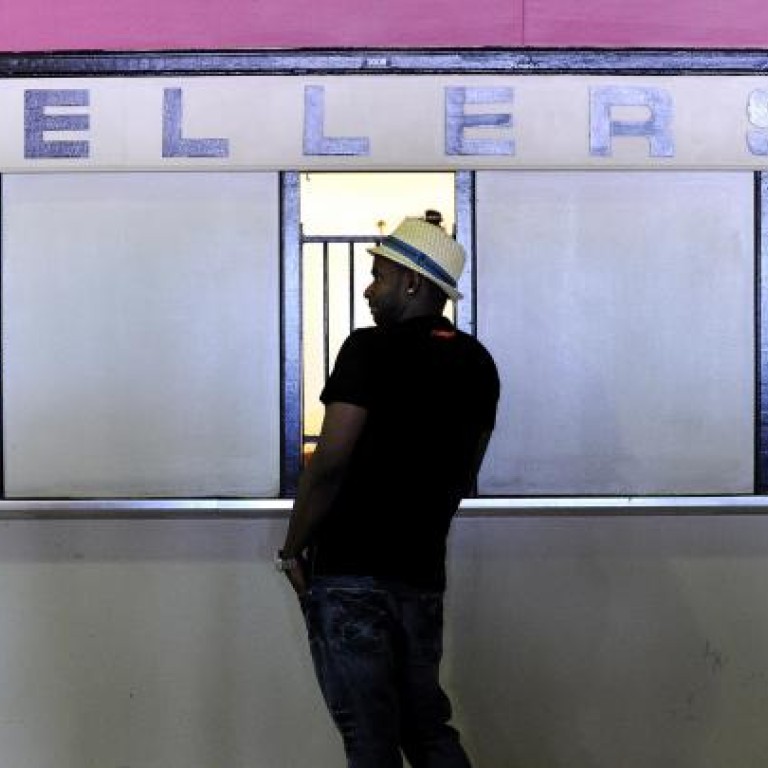
New Jersey sport betting should be a certainty
Moves by the biggest American sports to block legalisation are laughable
The bookies in this gambling city are grumbling a bit, which is always good news for those inclined to wager a few dollars on their favourite NFL team. Profits are down this season, thanks to some top teams that fans couldn't stop putting money on.
There was nothing particularly innovative about their winning strategy. Not with quarterbacks such as Peyton Manning and Aaron Rodgers covering the spread almost every time they took the field the second half of the season.
"It's easy to pick teams that are doing good," said Jimmy Vaccaro, a long-time odds-maker who has seen just about every trend - except a losing year for bookies - in 38 years behind the betting counter.
But there is no reason to worry as the play-offs will surely be money makers, and tomorrow's (Hong Kong time) Bowl Championship Series game with a dream betting match-up of Notre Dame and Alabama could draw the most money bet on a college game.
Football fans love to gamble, and they have been doing it in this city's legal sports books for decades now. Millions of dollars change hands every NFL weekend between gamblers who think they know more than odds-makers and the bookies who usually do know more than the people handing them money.
But what happens in Vegas doesn't just stay in Vegas. The lines are made there, but it's not hard to find illegal bookies in most major cities who will offer the same bets.
Add in the online sports books and the money wagered on an NFL season is generally measured in the billions, not millions. Huge sums ride on every pass, every call and every missed tackle.
Yet somehow the integrity of the NFL remains intact. There is not a whiff of scandal, not a reason to suspect anything might be amiss.
That is what makes the reaction of America's biggest sports leagues to attempts to legalise sports betting in New Jersey so laughable.
From the NFL to the NBA, they are united against efforts by New Jersey governor Chris Christie to sidestep a federal ban and allow wagering on games. The NCAA has joined the fight in a federal court in Newark, and Major League Baseball commissioner Bud Selig seems to take it as a personal affront.
"I have to say to you I'm appalled," Selig said in a deposition filed in the case. "I'm really appalled."
It is hardly surprising that the leagues are lined up against sports betting, mostly because their thought process is so rooted in the past.
They see gambling on their games as a threat cooked up in a back room somewhere by shady criminals just waiting for the chance to blackmail a troubled quarterback and fix the outcome of games.
Somehow, though, London - which has at least one betting shop on every major street - managed to hold an entire Olympics without any problems, while offering bets on everything from Usain Bolt winning the 100-metre dash to Michael Phelps getting seven golds.
The NFL, meanwhile, hosts a game in London every year and hasn't complained yet about fans being able to have a bet on their favourites on their way to the stadium.
There's nothing more immoral about it than betting on the stock market, or cashing in on your fantasy league's pot of cash.
The reality is that people want to bet on games and will do so whether it's legal or not. And if there is ever an attempt to fix a game, it's going to be discovered first by the legal bookies in this city that track every dollar on every game and know before anyone that something fishy is going on.
"It defies common sense that somehow the leagues are better off and the world is a better place where hundreds of billions are being wagered illegally," said Joe Asher, who runs United States operations for the British betting house William Hill.
"The idea that it is of benefit to a league when their fans are wagering with criminals rather than having a system where sports betting is regulated and run by honourable people who have undergone thorough investigations is ridiculous."
Don't tell that to NBA commissioner David Stern, who seemed nearly apoplectic when asked in his deposition on how legal betting in New Jersey could hurt his league.
"The one thing I'm certain of is New Jersey has no idea what it's doing and doesn't care because all it is interested in is making a buck or two, and they don't care that it's at our potential loss," Stern said.
Just what that loss would be is hard to understand. If anything, major sports leagues - the NFL in particular - have benefited from legal sports betting, with the betting line always a prominent part of any discussion leading up to a big game. It's part of the fabric of big-time sports, and without it we'd never know that Alabama are 9.5-point favourites over Notre Dame in the BCS game.
Still, allowing legal betting in New Jersey would be a game changer. It would give millions of fans easy access to a betting counter in an area of the country where the passion for sports runs deep. It will also make some people a lot of money. Legal sports book operators would surely profit, as would New Jersey in the taxes it collects on the bets.
About the only ones who won't make money are the leagues themselves, at least not directly. Unlike almost everything else they are involved with, they won't get a cut of the action.
That means potentially billions of dollars going into someone else's pockets.
And maybe that's the real reason why they protest so loudly.
